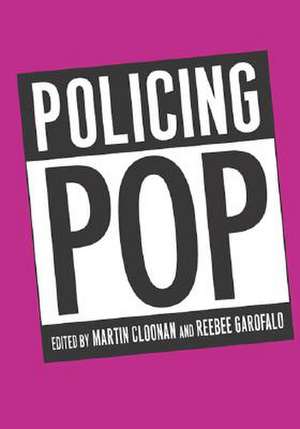Policing Pop
Autor M Cloonanen Limba Engleză Hardback – 19 oct 2021
The essays collected here focus on the forms of censorship as well as specific instances of how the state and other agencies have attempted to restrict the types of music produced, recorded and performed within a culture. Several show how even unsuccessful attempts to exert the power of the state can cause artists to self-censor. Others point to material that taxes even the most liberal defenders of free speech. Taken together, these essays demonstrate that censoring agents target popular music all over the world, and they raise questions about how artists and the public can resist the narrowing of cultural expression. Author note:
Martin Cloonan teaches Popular Music Culture at the University of Glasgow and is the author of Banned! Censorship of Popular Music in Britain, 1967-1992.
Reebee Garofalo is Professor at the College of Public and Community Service and is affiliated with the American Studies Program at the University of Massachusetts, Boston; his most recent book is Rockin' Out: Popular Music in the USA.
Preț: 531.11 lei
Preț vechi: 595.10 lei
-11% Nou
Puncte Express: 797
Preț estimativ în valută:
101.63€ • 106.11$ • 84.11£
101.63€ • 106.11$ • 84.11£
Carte indisponibilă temporar
Doresc să fiu notificat când acest titlu va fi disponibil:
Se trimite...
Preluare comenzi: 021 569.72.76
Specificații
ISBN-13: 9781566399890
ISBN-10: 1566399890
Pagini: 256
Dimensiuni: 182 x 262 x 24 mm
Greutate: 0.7 kg
Ediția:New.
Editura: ML – Temple University Press
ISBN-10: 1566399890
Pagini: 256
Dimensiuni: 182 x 262 x 24 mm
Greutate: 0.7 kg
Ediția:New.
Editura: ML – Temple University Press
Cuprins
Acknowledgments
Introduction
Part I: Defining Issues and Themes
1. Call That Censorship? Problems of Definition – Martin Cloonan
2. I Want My MP3: Who Owns Internet Music" – Reebee Garofalo
3. Twenty Years of Music Censorship Around the World – Vanessa Bastian and Dave Laing
4. Remote Control: Legal Censorship of the Creative Process – Steve Greenfield and Guy Osborn
Part II: Controlling the Artistic
5. Death Metal and the Limits of Musical Expression – Keith Kahn-Harris
6. Marxists in the Marketplace – Mike Jones
7. Argh Fuck Kill—Canadian Hardcore Goes on Trial: The Case of the Dayglo Abortions – Rob Bowman
8. Strelnikoff: Censorship in Contemporary Slovenia – David Parvo
Part III: Up Against the State
9. Music in the Struggle to End Apartheid: South Africa – Michael Drewett
10. Confusing Confucius: Rock in Contemporary China – Jeroen de Kloet (Holland)
11. German Nazi Bands: Between Provocation and Repression – Alenka Barber-Kersovan (Germany)
12. Popular Music and Policing in Brazil – José Roberto Zan (Brazil)
13. Challenging Music as Expression in the US – Paul D. Fischer (US)
About the Contributors
Introduction
Part I: Defining Issues and Themes
1. Call That Censorship? Problems of Definition – Martin Cloonan
2. I Want My MP3: Who Owns Internet Music" – Reebee Garofalo
3. Twenty Years of Music Censorship Around the World – Vanessa Bastian and Dave Laing
4. Remote Control: Legal Censorship of the Creative Process – Steve Greenfield and Guy Osborn
Part II: Controlling the Artistic
5. Death Metal and the Limits of Musical Expression – Keith Kahn-Harris
6. Marxists in the Marketplace – Mike Jones
7. Argh Fuck Kill—Canadian Hardcore Goes on Trial: The Case of the Dayglo Abortions – Rob Bowman
8. Strelnikoff: Censorship in Contemporary Slovenia – David Parvo
Part III: Up Against the State
9. Music in the Struggle to End Apartheid: South Africa – Michael Drewett
10. Confusing Confucius: Rock in Contemporary China – Jeroen de Kloet (Holland)
11. German Nazi Bands: Between Provocation and Repression – Alenka Barber-Kersovan (Germany)
12. Popular Music and Policing in Brazil – José Roberto Zan (Brazil)
13. Challenging Music as Expression in the US – Paul D. Fischer (US)
About the Contributors
Recenzii
"All in all, Policing Pop takes the reader on quite a ride. Its contributing authors include, among others, musicologists, sociologists, and law professors who offer intellectually rewarding insights and eloquent arguments for the political and cultural importance of popular music, something with which even young people would agree, if they could be enticed to read them." Popular Music and SocietyPolicing Pop works well as a collection that reinforces the common themes of music regulation and practice, and is an effective teaching text for popular music and cultural studies. Perfect Beat: The Pacific Journal of Research into Contemporary Music and Popular Culture"Policing Pop not only provides a fascinating survey of the ways in which pop has been censored and restricted, it also makes an eloquent argument for the political and social importance of popular music. This book serves as a rich reminder of how songs can make the powerful nervous and the powerless bold." John Street, University of East Anglia"Music censorship! What censorship? Policing Pop introduces the reader to the underlying mechanisms of music censorship and its effects on individuals and society in different parts of the world. Policing Pop will inspire and challenge further dissemination and the unveiling of appalling cases as well as concealed causes for censorship in this hitherto disregarded area of academic research." Marie Korpe, Executive Director, Freemuse (Freedom of Musical Expression), The World Forum on Music &Censorship "This fascinating, albeit at times disturbing, read will make you nod in agreement or sigh in disbelief at the measures people have taken to control popular music." Multicultural ReviewAn invigorating and thought-provoking selection of essays
its a fascinating read
With its easily accessible style and deep relevance, Policing Pop is hopefully already on the reading list of every Media Culture and Society and related courses. Its pink cover and sexy PP title will ensure it will walk off the shelves for those who still frequent bookshops. Popular Music 26/2 2007
Descriere
Looks into the many ways in which popular music and artists around the world are subjected to censorship
